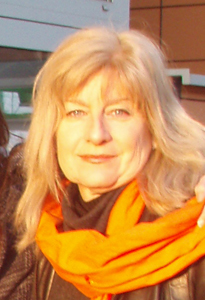
Heather Dune Macadam
Heather Dune Macadam is fighting to bring the story of 999 girls to life.
Macadam is currently fundraising to make a documentary film called First Transport to Auschwitz: The Story of 999 Girls. The deadline for her Kickstarter campaign is Mon., March 31; click here to make a donation.
Macadam is co-author of Rena’s Promise: A Story of Sisters in Auschwitz (1995), a memoir of Holocaust survivor Rena Kornreich Gelissen, the 716th woman in Auschwitz. The book was nominated for the National Book Award, the Christopher Awards, the American Jewish Awards and the National Library Association Awards.
Rena (whose testimony is in the Visual History Archive) was part of Auschwitz’s very first transport of 999 prisoners (after its initial transport of German women designated by Nazis to be kapos, or supervisors over their fellow prisoners). The entire transport was made up of Slovakian girls ages 16-22, Macadam said, who had been told by their government that they would be going to a work camp where they could help support their families.
Macadam learned that Rena knew of two other survivors of her transport to Auschwitz, one of whom kept her time in Auschwitz a secret. Macadam contacted USC Shoah Foundation’s Visual History Archive curator, Crispin Brooks, for help researching names of others from the first transport who were mentioned in the Visual History Archive. He sent her a list of 22 names, including their maiden names, married names and prison numbers.
Two years ago, Macadam said, she attended the commemoration of the 70th anniversary of the first registered mass transit of Jews to Auschwitz in Poprad, Slovakia. When she arrived at the memorial site on the day of the anniversary, March 25, she noticed that people had already left candles and flowers.
“It was a really big deal, and no one in the West had a clue,” Macadam said.
Macadam left a laminated copy of her list of names at the memorial site. A few days later, the niece and nephew of one of the women on the list, Adela Gross, found it and contacted her. Up until that moment, they had never known what happened to Adela, Macadam said. Just 16 years old, she volunteered to go on the transport in place of her sister (their mother), thus saving their mother’s life, but died in Auschwitz.
“These stories are so powerful,” Macadam said. “This is about genocide, and genocide always begins with young women. If you want to destroy a race of people, you attack the young women.”
Unfortunately, Adela’s family are not the only ones who don’t know much about these first victims of the Holocaust. Many survivors have avoided talking about their experiences and the topic has not been widely researched, Macadam said.
With funds from the Kickstarter campaign, Macadam can hire a camera operator and other staff and begin interviewing survivors around the world. Because there are so few left, timing is crucial.
She also intends to incorporate materials and clips from the Visual History Archive into the film, such as photographs that survivors often show at the end of their testimony.
“The visual is so important to me,” Macadam said. “To see a picture of an old woman when she was young-- they’re so beautiful. To see the hope and innocence in their faces helps me connect emotionally.”
Macadam said it’s important to tell their stories so that other girls and women can know their history and be empowered by it.
“Every single [survivor says] ‘Don’t waste your life’ and ‘Love everybody.’ They are incredible spirits,” Macadam said. “It would be a great gift for us to honor them.”